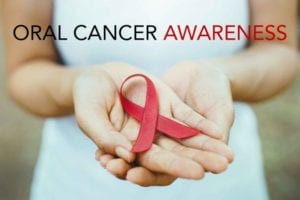 Cancer is a very frightening word. By definition, cancer is uncontrollable cell growth that may invade and damage the surrounding tissue. Oral cancer is challenging because it can change your day to day life, like the way you eat or speak. In its worst case, it threatens your life. It often goes undiagnosed because many of its symptoms are mistaken for other ailments. This is Oral Cancer Awareness Month, so take the time to familiarize yourself with the signs and treatment options.
Cancer is a very frightening word. By definition, cancer is uncontrollable cell growth that may invade and damage the surrounding tissue. Oral cancer is challenging because it can change your day to day life, like the way you eat or speak. In its worst case, it threatens your life. It often goes undiagnosed because many of its symptoms are mistaken for other ailments. This is Oral Cancer Awareness Month, so take the time to familiarize yourself with the signs and treatment options.
The Signs of Oral Cancer
The most common symptom of oral cancer is sores in the mouth that don’t go away. They often occur on the cheeks, lips, and gums. Any swollen places, thickenings, lumps, rough spots, eroded areas, or crusted places should also be a cause for concern.
Many people with oral cancer will develop white and red patches along their mouth. They may also experience unexplained bleeding or numbness/pain/tingling around the face, neck, and mouth. These same areas are often the site of persistent sores (places that don’t heal within two weeks).
Oral cancer can lead to soreness in the back of the throat or the sensation of something caught there. Hoarseness, change in voice, and difficulty chewing and swallowing are warning signs as well. Even sudden weight loss or ear pain could be a signal from your body that something is wrong.
Risk Factors for Oral Cancer
No one is immune to oral cancer, but some people are at a higher risk than others are. Studies show that men are twice as likely to be afflicted – particularly if they are older than 50. More than 40,000 people were diagnosed with oral cancer last year.
There are several main risk factors for oral cancer, including:
- Smokers (cigarettes, cigars, or pipes) are six times more likely to have oral cancer.
- Smokeless tobacco users. This presents the greatest risk, as snuff, dip, and chewing tobacco users are 50 times more likely to have cancer.
- Drinkers are six times more at risk.
- Family history or cancer, especially oral.
- Excessive sun exposure. Too much sun damages your entire body, not just your skin.
- People with human papilloma virus. Oropharyngeal squamous cell carcinoma links to certain strains of this virus.
Prognosis
As with any cancer, early detection is key. Knowing what symptoms to look for can make a world of difference in comfort level and treatment outcomes. If you’re experiencing any of the symptoms above, see your oral health specialist as soon as possible.
The information and content on our website should not be used as a substitute for medical treatment or advice from your doctor.









